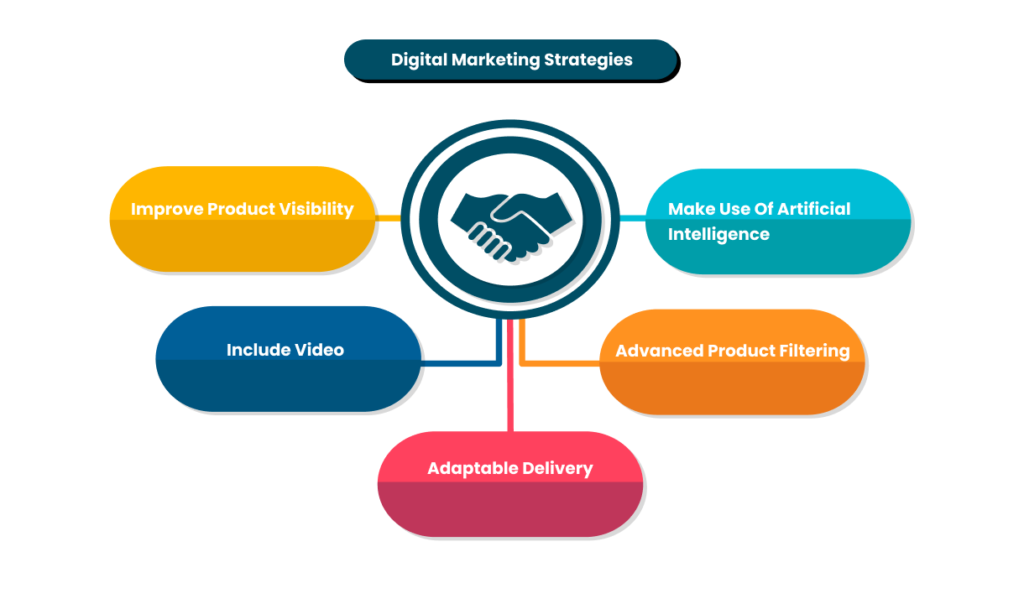Digital marketing has now permeated every industry. The fundamental cause for this phenomenon is that business processes are growing at a rapid pace, and there is a great deal of experimentation and change in the industry. We are being distracted by one or more forthcoming trends. We can’t pretend about consumers because their behavior changes by the minute. As a mechanism, digital marketing can easily respond to these developments.
What is popular today may not be popular next month.
All of this is posing numerous hurdles for various firms. So, the question is, how do you keep up with everything?
E-commerce is a type of business in which purchasing and selling are entirely dependent on the internet. As a result, Digital Marketing enters the picture, as it is the sole medium that can assist E-commerce businesses in growing. The rapid growth of cell phones and the internet provides easy access to selling and acquiring items.
Why is Digital Marketing Important for Businesses?
E-commerce generates a lot of money when it uses digital marketing Strategies to recruit customers and build brand value. Customers no longer rely just on content or word-of-mouth when purchasing a product; they examine product reviews on all platforms where the product is displayed.
According to a recent survey, 37 million social media visits resulted in around 529,000 orders. Among others, Facebook helps to increase visitors to the website, which leads to sales, which account for an average of 85% of all orders.
It has become critical to capture clients’ attention because they are quickly distracted; this is where Digital Marketing comes into play to assist E-commerce enterprises in dealing with such issues.
Digital marketing focuses on combining proper marketing channels to make it easier for E-commerce enterprises; find out more about a few of the most essential Digital marketing channels below.
- Search Engine Optimization (SEO)
Search Engine Optimization (SEO) is a blessing in disguise for your e-commerce business. It is the process of enhancing the volume and quality of traffic to your website via organic search engine results.
- Search Engine Marketing (SEM)
Search Engine Marketing (SEM) is concerned with increasing the visibility of a website in order to improve organic search engine ranking. It is an ideal route for achieving short-term outcomes swiftly.
Search engine marketing (SEM) uses keyword-based paid ad campaigns to reach out to users who are actively looking for your website.
- Email Promotion
Email marketing isn’t dead yet; it’s still the most successful Digital Marketing channel for merchants, producing real ROI.
Emails play a crucial role in offering a better purchasing experience for customers. When you order or pay for a product on an e-commerce website, you will receive an email confirmation as well as a digital invoice. Users may email you with questions about products, and your experience, or to remind you of an abandoned shopping cart. or requests for general company information Personalized emails make it easier for your customers to connect with your company.
- Social Media Promotion (SMM)
Social media has taken over the globe; almost no one is not active on social media. Posting on Instagram or Facebook on a daily basis has become a habit. Social media has made it easier for firms to reach out to customers. As social networks grow in popularity, digital marketers must incorporate paid social media into their marketing strategy in order to reach more clients.
What are digital marketing strategies?

1) Improve Product Visibility
Consumers have learned to expect instant access to virtually any 2type of information. Not only that, but they’ve gotten increasingly visible. Using great product visualization allows you to swiftly and easily show off your products so that customers can glance at the details without having to read about them.
2) Include a Video
While not all goods necessitate video, if you have anything to show off, show it in action. According to HubSpot, 81% of shoppers feel video gives them confidence when making purchases. People will comprehend what your product does and why they need it if you demonstrate how well it slices and dices.
3) Make use of artificial intelligence (AI)
AI has the potential to significantly increase your e-commerce revenues. It can collect data and utilize it to precisely forecast how a customer will behave based on previous behavior. Measurable metrics like conversion rates, bounce rates, and engagement rates provide vital insight into the success of your site and how visitors interact with it.
4) Advanced Product Filtering
The more products you sell, the more advanced product filtering you’ll need. Nobody has time to search your website based on a complicated inventory plan that makes no sense to them. Instead, you must equip them with the tools to shop on their terms and swiftly find what they require.
5) Adaptable Delivery
Limiting delivery alternatives is an excellent method to encourage cart abandonment. When they discover that the delivery options do not meet their demands, 45 percent of online buyers abandon their carts.
Conclusion
It is impossible for an E-commerce platform to flourish naturally over a short period of time. Digital marketing pros may help by capturing maximum attention from target audiences and assisting your organization in converting those into purchases. Also, keep in mind that more digital marketing channels may emerge in the future, so first master the ones listed above before moving on to the new ones.



